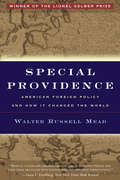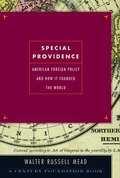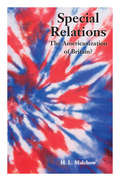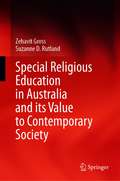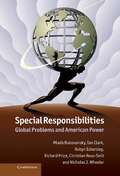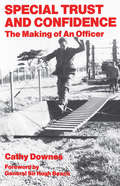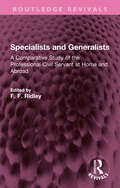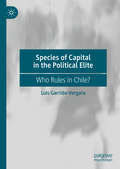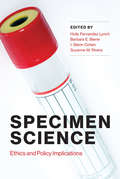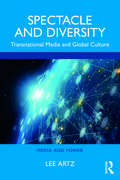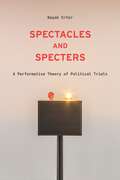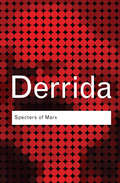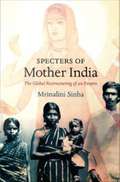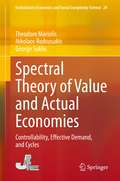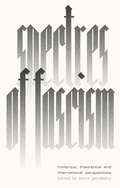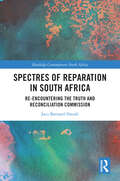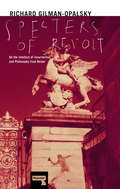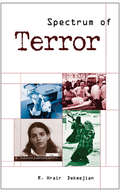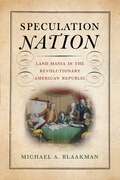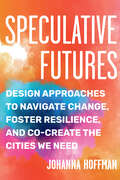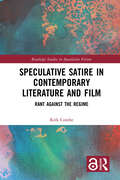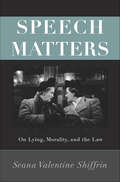- Table View
- List View
Special Providence: American Foreign Policy and How It Changed the World
by Walter Russell Mead"God has a special providence for fools, drunks and the United States of America."--Otto von BismarckAmerica's response to the September 11 attacks spotlighted many of the country's longstanding goals on the world stage: to protect liberty at home, to secure America's economic interests, to spread democracy in totalitarian regimes and to vanquish the enemy utterly.One of America's leading foreign policy thinkers, Walter Russell Mead, argues that these diverse, conflicting impulses have in fact been the key to the U.S.'s success in the world. In a sweeping new synthesis, Mead uncovers four distinct historical patterns in foreign policy, each exemplified by a towering figure from our past.Wilsonians are moral missionaries, making the world safe for democracy by creating international watchdogs like the U.N. Hamiltonians likewise support international engagement, but their goal is to open foreign markets and expand the economy. Populist Jacksonians support a strong military, one that should be used rarely, but then with overwhelming force to bring the enemy to its knees. Jeffersonians, concerned primarily with liberty at home, are suspicious of both big military and large-scale international projects.A striking new vision of America's place in the world, Special Providence transcends stale debates about realists vs. idealists and hawks vs. doves to provide a revolutionary, nuanced, historically-grounded view of American foreign policy.
Special Providence: American Foreign Policy and How It Changed the World
by Walter Russell MeadFrom one of our leading experts on foreign policy, a full-scale reinterpretation of America's dealings--from its earliest days--with the rest of the world.It is Walter Russell Mead's thesis that the United States, by any standard, has had a more successful foreign policy than any of the other great powers that we have faced--and faced down. Beginning as an isolated string of settlements at the edge of the known world, this country--in two centuries--drove the French and the Spanish out of North America; forced Britain, then the world's greatest empire, to respect American interests; dominated coalitions that defeated German and Japanese bids for world power; replaced the tottering British Empire with a more flexible and dynamic global system built on American power; triumphed in the Cold War; and exported its language, culture, currency, and political values throughout the world.Yet despite, and often because of, this success, both Americans and foreigners over the decades have routinely considered American foreign policy to be amateurish and blundering, a political backwater and an intellectual wasteland.Now, in this provocative study, Mead revisits our history to counter these appraisals. He attributes this unprecedented success (as well as recurring problems) to the interplay of four schools of thought, each with deep roots in domestic politics and each characterized by a central focus or concern, that have shaped our foreign policy debates since the American Revolution--the Hamiltonian: the protection of commerce; the Jef-fersonian: the maintenance of our democratic system; the Jacksonian: populist values and military might; and the Wilsonian: moral principle. And he delineates the ways in which they have continually, and for the most part beneficially, informed the intellectual and political bases of our success as a world power. These four schools, says Mead, are as vital today as they were two hundred years ago, and they can and should guide the nation through the challenges ahead.Special Providence is a brilliant analysis, certain to influence the way America thinks about its national past, its future, and the rest of the world.
Special Relations
by H. L. MalchowSpecial Relations reevaluates Anglo-American cultural exchange by exploring metropolitan London's culture and counterculture from the 1950s to the 1970s. It challenges a tendency in cultural studies to privilege local reception and attempts to restore the concept of Americanization in this critical era of mass tourism, professional exchange, and media globalization—while acknowledging an important degree of cultural hybridity and circularity. The study begins with the influence of American modernism in the built environment and in "Swinging London" generally, and then moves to its central project, the re-exploration of British counterculture—the anti-war movement, student rebellion, hippies, popular music, the alternative press, and the late Sixties triad of black, feminist, and gay liberationisms—as intimately tied to American experience and to American agents of cultural change. Special Relations retrieves these phenomena as more central and enduring in British metropolitan life than the current orthodoxy allows, and subjects to sharp critical scrutiny prevalent assertions of cultural "authenticity" in their British variants. Finally, the book looks at aspects of the turn against modernism and the counterculture in the 1970s.
Special Relationships in World Politics: Inter-state Friendship and Diplomacy after the Second World War (New International Relations)
by Kristin HaugevikClaims of inter-state ‘specialness’ are commonplace in international politics. But how do some relationships between states come to be seen and categorized as ‘special’ in the first place? And what impact, if any, do recurring public representations of specialness have on states’ political and diplomatic interaction? While much scholarly work exists on alleged instances of special relationships, and on inter-state cooperation and alliances more generally, little systematic and theory informed research has been conducted on how special relationships evolve and unfold in practice. This book offers such a comprehensive study. Theorizing inter-state relations as ongoing social processes, it makes the case for approaching special relationships as constituted and upheld through linguistic representations and bilateral interaction practices. Haugevik explores this claim through an in-depth study of how the bilateral relationship most frequently referred to as ‘special’ – the US-British – has unfolded over the last seventy years. This analysis is complemented with a study of Britain’s relationship with a more junior partner, Norway, during the same period. The book offers an original take on inter-state relations and diplomacy during the Cold War and after, and develops an analytical framework for understanding why some state relationships maintain their status as ‘special’, while others end up as ‘benignly neglected’ ones.
Special Religious Education in Australia and its Value to Contemporary Society
by Zehavit Gross Suzanne D. RutlandThis book explores the advantages of and challenges concerning Special Religious Education (SRE) in multicultural Australia and argues for the need for General Religious Education (GRE) as well. Through the lens of the most recent scholarship, and drawing on an in-depth qualitative study and specific case studies, the book examines the current debate on the role of religious education within government schools. It addresses key concepts of values education, spirituality, health and wellbeing, and cultural and religious identity. It analyses why it is important to retain SRE, together with GRE, as government policy. It explores highly relevant, controversial and contested issues regarding SRE, including the 30% of Australia’s population who declare themselves as having “no religion”, and brings fresh insights to the table. While secularization has increased in both the national and international spheres, there has also been an increase in fundamentalism within religious beliefs. Events such as the September 11 terror attacks and the more recent mass shootings by white supremacists and eco-fascists in Christchurch, New Zealand, and Pittsburgh and San Diego in the USA are reminders that religion is still a major actor in the twenty-first century. This poses new challenges for the relationship between church and state, and demonstrates the need to revisit the role of religious education within government schools. While the importance of GRE is generally acknowledged, SRE has increasingly come under attack by some researchers and teacher and parent bodies as being inappropriate and contradictory to the values of the postmodern world. On the other hand, the key stakeholders from all the faith traditions in Australia wish to retain the SRE classes in government schools. The book addresses this burning issue, and shows that it is relevant not only for Australia but also globally.
Special Responsibilities
by Richard Price Mlada Bukovansky Christian Reus-Smit Ian Clark Nicholas J. Wheeler Robyn EckersleyThe language of special responsibilities is ubiquitous in world politics, with policymakers and commentators alike speaking and acting as though particular states have, or ought to have, unique obligations in managing global problems. Surprisingly, scholars are yet to provide any in-depth analysis of this fascinating aspect of world politics. This path-breaking study examines the nature of special responsibilities, the complex politics that surround them and how they condition international social power. The argument is illustrated with detailed case-studies of nuclear proliferation, climate change and global finance. All three problems have been addressed by an allocation of special responsibilities, but while this has structured politics in these areas, it has also been the subject of ongoing contestation. With a focus on the United States, this book argues that power must be understood as a social phenomenon and that American power varies significantly across security, economic and environmental domains.
Special Trust and Confidence: The Making of an Officer
by Cathy DownesThis is an examination and an analysis of the systems of recruitment, selection, education and training for junior officers in the British Armed Forces. It is a study based around four core institutions: The Royal Military Academy, Sandhurst, The Britannia Royal Naval College, Dartmouth, the Department of Initial Officer Training, Royal Air Force College, Cranwell and the Officers Training Wing, Commando Training Centre, Royal Marines, Lympstone. The conclusions reveal the enduring dilemmas involved in the preparation of officer aspirants for entry to the British military profession.
Specialists and Generalists: A Comparative Study of the Professional Civil Servant at Home and Abroad (Routledge Revivals)
by F. F. RidleyOriginally published in 1968, this book provides surveys of the Australian, French, German, Swedish and American systems of public administration. Previously unpublished material on the professional classes in Britain was made available which filled a gap in the (then) available textbooks on British government. A concluding chapter deals with the wider aspects of the generalist versus specialist problem, an original contribution to administrative theory. The book will be of interest to students of politics and government and the student of comparative administration, as well as to those concerned with civil service reform
Species of Capital in the Political Elite: Who Rules in Chile?
by Luis Garrido-VergaraAlthough sociological research has examined the reproduction of Chile’s elites, there is little empirical evidence as to how different forms of capital operate within them. Based on a survey of the country’s elites, this study examines the effect of different forms of capital (cultural, social and political) on access to strategic positions in the legislative and executive branches of government. It focuses on the political elite between 1990, when military dictator Augusto Pinochet handed over the presidency to Patricio Aylwin, his democratically elected successor, and 2010, the end of President Michelle Bachelet’s first government. At least three points are germane to this analysis: (1) understanding the nature of the party elites during the political transition; (2) describing and explaining the main aspects of the party elites’ background and social resources, including their family networks (independent variables); and (3) exploring the effect of those variables on individuals’ chances of achieving strategic positions in the political field, comparing the legislative and executive branches as represented by deputies and ministers (dependent variable).
Specimen Science: Ethics and Policy Implications (Basic Bioethics)
by Holly Lynch Barbara Bierer I. Cohen Suzanne RiveraLegal, regulatory, and ethical perspectives on balancing social benefit and human autonomy in research using human biospecimens.Advances in medicine often depend on the effective collection, storage, research use, and sharing of human biological specimens and associated data. But what about the sources of such specimens? When a blood specimen is drawn from a vein in your arm, is that specimen still you? Is it your property, intellectual or otherwise? Should you be allowed not only to consent to its use in research but also to specify under what circumstances it may be used? These and other questions are at the center of a vigorous debate over the use of human biospecimens in research. In this book, experts offer legal, regulatory, and ethical perspectives on balancing social benefit and human autonomy in biospecimen research.After discussing the background to current debates as well as several influential cases, including that of Henrietta Lacks, the contributors consider the rights, obligations, risks, and privacy of the specimen source; different types of informed consent under consideration (broad, blanket, and specific); implications for special patient and researcher communities; and the governance of biospecimen repositories and the responsibilities of investigators.ContributorsRebecca A. Anderson, Heide Aungs, Avery Avrakotos, Mark Barnes, Jill Barnholtz-Sloan, Benjamin Berkman, Barbara E. Bierer, Mark A. Borreliz, Jeffrey R. Botkin, Dan Brock, Ellen Wright Clayton, I. Glenn Cohen, Lisa Eckstein, Barbara J. Evans, Emily Chi Fogler, Nanibaa' A. Garrison, Pamela Gavin, Aaron J. Goldenberg, Christine Grady, Kate Gallin Heffernan, Marylana Saadeh Helou, Sara Chandros Hull, Elisa A. Hurley, Steven Joffe, Erin P. Johnson, Julie Kaneshiro, Aaron S. Kesselheim, Isaac Kohane, David Korn, Russell Korobkin, Bernard Lo, Geoffrey Lomax, Kimberly Hensle Lowrance, Holly Fernandez Lynch, Bradley A. Malin, Karen J. Maschke, Eric M. Meslin, P. Pearl O'Rourke, Quinn T. Ostrom, David Peloquin, Rebecca Pentz, Jane Perlmutter, Ivor Pritchard, Suzanne M. Rivera, Erin Rothwell, Andrew P. Rusczek, Rachel E. Sachs, Carol Weil, David Wendler, Benjamin Wilfond, Susan M. Wolf
Spectacle and Diversity: Transnational Media and Global Culture (ISSN)
by Lee ArtzThis book shows how transnational media operate in the contemporary world and what their impact is on film, television, and the larger global culture. Where a company is based geographically no longer determines its outreach or output. As media consolidate and partner across national and cultural boundaries, global culture evolves. The new transnational media industry is universal in its operation, function, and social impact. It reflects a shared transnational culture of consumerism, authoritarianism, cultural diversity, and spectacle. From Wolf Warriors and Sanju to Valerian: City of 1000 Planets and Pokémon, new media combinations challenge old assumptions about cultural imperialism and reflect cross-boundary collaboration as well as boundary-breaking cultural interpretation. Intended for students of global studies and international communication at all levels, the book will appeal to a wide range of readers interested in the way transnational media work and how that shapes our culture.
Spectacle and Diversity: Transnational Media and Global Culture (Media and Power)
by Lee Burton ArtzThis book shows how transnational media operate in the contemporary world and what their impact is on film, television, and the larger global culture. Where a company is based geographically no longer determines its outreach or output. As media consolidate and partner across national and cultural boundaries, global culture evolves. The new transnational media industry is universal in its operation, function, and social impact. It reflects a shared transnational culture of consumerism, authoritarianism, cultural diversity, and spectacle. From Wolf Warriors and Sanju to Valerian: City of 1000 Planets and Pokémon, new media combinations challenge old assumptions about cultural imperialism and reflect cross-boundary collaboration as well as boundary-breaking cultural interpretation. Intended for students of global studies and international communication at all levels, the book will appeal to a wide range of readers interested in the way transnational media work and how that shapes our culture.
Spectacles and Specters: A Performative Theory of Political Trials
by Başak ErtürWINNER, SLSA SOCIO-LEGAL THEORY AND HISTORY PRIZESHORTLISTED, THE HART-SLSA BOOK PRIZESpectacles and Specters draws on theories of performativity to conceptualize the entanglements of law and political violence, offering a radical departure from accounts that consider political trials as instrumental in exercising or containing political violence. Legal scholar Başak Ertür argues instead that making sense of the often incalculable interpenetrations of law, politics, and violence in trials requires shifting the focus away from law’s instrumentality to its performativity.Ertür develops a theory of political trials by reconstructing and building on a legacy of critical thought on Nuremberg in close engagement with theories of performativity. She then offers original case studies that introduce a new perspective by looking beyond the Holocaust trials, to the Armenian genocide and its fragmentary legal aftermaths. These cases include the 1921 trial of Soghomon Tehlirian, the 2007-21 Hrant Dink Murder Trial, and the 2015 case before the European Court of Human Rights concerning the denial of the Armenian genocide. Enabling us to capture the various modalities in which the political emerges in, through and in relation to legal forms on the stage of the trial, this focus on law’s performativity also allows us to account for how sovereign schemes can misfire and how trials can come to have unintended political lives and afterlives. Further, it reveals how law is entangled with and perpetuates certain histories of violence, rather than simply ever mastering these histories or providing closure.
Specters of Marx: The State of the Debt, the Work of Mourning and the New International
by Jacques DerridaProdigiously influential, Jacques Derrida gave rise to a comprehensive rethinking of the basic concepts and categories of Western philosophy in the latter part of the twentieth century, with writings central to our understanding of language, meaning, identity, ethics and values. In 1993, a conference was organized around the question, 'Whither Marxism?’, and Derrida was invited to open the proceedings. His plenary address, 'Specters of Marx', delivered in two parts, forms the basis of this book. Hotly debated when it was first published, a rapidly changing world and world politics have scarcely dented the relevance of this book.
Specters of Mother India: The Global Restructuring of an Empire
by Mrinalini SinhaSpecters of Mother India tells the complex story of one episode that became the tipping point for an important historical transformation. The event at the center of the book is the massive international controversy that followed the 1927 publication of Mother India, an expos written by the American journalist Katherine Mayo. Mother India provided graphic details of a variety of social ills in India, especially those related to the status of women and to the particular plight of the country's child wives. According to Mayo, the roots of the social problems she chronicled lay in an irredeemable Hindu culture that rendered India unfit for political self-government. Mother India was reprinted many times in the United States, Great Britain, and India; it was translated into more than a dozen languages; and it was reviewed in virtually every major publication on five continents. Sinha provides a rich historical narrative of the controversy surrounding Mother India, from the book's publication through the passage in India of the Child Marriage Restraint Act in the closing months of 1929. She traces the unexpected trajectory of the controversy as critics acknowledged many of the book's facts only to overturn its central premise. Where Mayo located blame for India's social backwardness within the beliefs and practices of Hinduism, the critics laid it at the feet of the colonial state, which they charged with impeding necessary social reforms. As Sinha shows, the controversy became a catalyst for some far-reaching changes, including a reconfiguration of the relationship between the political and social spheres in colonial India and the coalescence of a collective identity for women.
Spectral Theory of Value and Actual Economies: Controllability, Effective Demand, and Cycles (Evolutionary Economics and Social Complexity Science #24)
by Theodore Mariolis Nikolaos Rodousakis George SoklisThis book develops a unified treatment of the income distribution–capital–value problems with respect to actual economies, and then gradually turns to the issues of effective demand and capitalist accumulation fluctuations from both political economy and economic policy perspectives. That treatment, on the one hand, places produced means of production, positive profits, and capital accumulation at the centre of the analysis and, on the other hand, is analytically based on the modern control theory. Hence, the authors’ investigation is concerned with input–output representations of actual single and joint production, heterogeneous labour, and open economies; zeroes in on the characteristic value distributions of the system matrices; and, finally, derives meaningful theoretical results consistent with the empirical evidence, and vice versa. The main topics addressed are the uncontrollable/unobservable aspects of the real-world economies, the powerful low-order spectral approximations and reconstructions of the inter-industry structure of production–value–distributive variables relationships, the critical-constructive appraisal of both “mainstream” and “radical” theories of value, the matrix demand multipliers and demand-switching policies in heterogeneous capital worlds, and the circular inter-actions amongst income distribution, effective demand, accumulation, and technical conditions of production. Written on the occasion of the 60th anniversary of the publication of both Piero Sraffa’s Production of Commodities by Means of Commodities and Rudolf E. Kalman’s paper “On the general theory of control systems”, this book provides a consistent and comprehensive framework for theoretical, empirical, and economic policy research.
Spectres of Fascism: Historical, Theoretical, and International Perspectives
by Samir GandeshaConcerns over the rise of fascism have been preoccupied with the Trump presidency and the Brexit vote in the UK, yet, globally, we are witnessing a turn towards anti-democratic and illiberal forces. From the tragic denouement of the Egyptian Revolution to the consolidation of the so-called Gujarat Model in India under the leadership of Prime Minister Narendra Modi and the consolidation of the power of Turkish President Recep Tayyip Erdogan, to the recent election of Jair Bolsonaro in Brazil, fascist ideology, aesthetics, and personalities appear across the globe. Spectres of Fascism makes a significant contribution to the unfolding discussion on whether what we are witnessing today is best understood as a return to classic twentieth-century fascism or some species of what has been called “post-fascism.” Applying a uniquely global perspective, it combines analyses of historical contexts, theoretical approaches, and contemporary geopolitics.
Spectres of Reparation in South Africa: Re-encountering the Truth and Reconciliation Commission (Routledge Contemporary South Africa)
by Jaco Barnard-NaudeThis book argues that South Africa is haunted by the spectre of reparation. The failure of the South African Truth and Reconciliation Commission to secure adequate reparation for the victims of colonisation and apartheid continues to drastically undermine the commission’s processes and legacy. Investigating the TRC’s key processes of amnesty, archiving and forgiveness in turn, the book demonstrates that each process is fundamentally thwarted by the terminal lack of reparation. These multiple forms of the spectre of reparation haunt post-apartheid society in deeply traumatogenic ways. The book proposes a new ethic of "reparative citizenship" as a means of encountering the spectres of reparation in a productive and transformative manner, generating hope even in the face of the irreparable. This book will be an important read for South Africans interested in overcoming the impasses and injustices that haunt the country, but it will also be of interest to post-conflict transitional justice and politics researchers more broadly.
Spectres of Revolt
by Richard Gilman-OpalskyIn 1848, Karl Marx declared that a communist specter was haunting Europe. In 1994, Jacques Derrida considered how the spectre of Marx would haunt the post-Cold War world. In Specters of Revolt, Gilman-Opalsky argues that the world is haunted by revolt, by the possibility of events that interrupt and disrupt the world, that throw its reality and justice into question. But recent revolt is neither decisively communist nor decisively Marxist. Gilman-Opalsky develops a theory of revolt that accounts for its diverse critical content about autonomy, everyday life, anxiety, experience, knowledge, and possibility. The 1994 uprising of the Mexican Zapatistas set the stage for new forms of revolt against a newly expanded power of capital. In the 20 years since, including the recent phase of global uprisings that began in 2008 with the Greek revolts, insurrection has spoken in the "Arab Spring" in Spain, Turkey, Brazil, and in the U.S. in Occupy Wall Street, Ferguson, and Baltimore, among other places. In light of recent global uprisings, Gilman-Opalsky aims to move beyond the critical theory of revolt to an understanding of revolt as theory itself. Making use of diverse sources from Raoul Vaneigem and Félix Guattari to Julia Kristeva and Raya Dunayevskaya, Spectres of Revolt explores upheaval as thinking, the intellect of insurrection, and philosophy from below.From the Trade Paperback edition.
Spectrum of Terror
by Richard H. DekmejianSince 9/11, images of fanatical jihadists have become the international symbol of terrorism. In the wake of the attacks, journalists and academics alike have taken up the task of trying to make sense of these seemingly alien terrorist organizations. Many of these sources have perpetuated the idea that terrorists are unknowable or irrational. What is often missed is the degree to which terrorists have motivations that can be grasped and understood.In his new text, Dekmejian places terrorism within a spectrum of political violence, creating a typology of terror based on scale and intent as well as by type of actor—from isolated attacks by individual bombers, to large scale attacks against state targets by organized networks, to state-sponsored genocide and politicide—thus facilitating comparisons across multiple cases. As well, the book’s model of conflict is informed by game theory, enriched with understandings of psychological, cultural, and historical contexts, helping students focus on the strategies and desired outcomes of different parties to conflict. This analytic approach enables students to trace the changes in mutual perceptions and preferences between terrorists and their targets and leads to a fuller understanding of the causes and dynamics of political violence. The book’s uniquely comprehensive coverage of terrorism includes extended cases on the IRA, the Tamil Tigers, Chechen rebels, Al Qaeda, Aum Shinrikyo, Hizbullah, and Hamas. Each case looks at the historical origins, political factors, leadership, and organization of the group to give context. Discussions of typical tactics, patterns of violence, the role of external actors, and outcomes help readers to explore possible solutions that might stop the cycle of violence and promote peaceful coexistence among the antagonists. Appendix materials include glossaries of terrorist groups and technical terms.
Speculation Nation: Land Mania in the Revolutionary American Republic (Early American Studies)
by Michael A. BlaakmanDuring the first quarter-century after its founding, the United States was swept by a wave of land speculation so unprecedented in intensity and scale that contemporaries and historians alike have dubbed it a “mania.” In Speculation Nation, Michael A. Blaakman uncovers the revolutionary origins of this real-estate bonanza—a story of ambition, corruption, capitalism, and statecraft that stretched across millions of acres from Maine to the Mississippi and Georgia to the Great Lakes.Patriot leaders staked the success of their revolution on the seizure and public sale of Native American territory. Initially, they hoped that fledgling state and national governments could pay the hefty costs of the War for Independence and extend a republican society of propertied citizens by selling expropriated land directly to white farmers. But those democratic plans quickly ran aground of a series of obstacles, including an economic depression and the ability of many Native nations to repel U.S. invasion. Wily merchants, lawyers, planters, and financiers rushed into the breach. Scrambling to profit off future expansion, they lobbied governments to convey massive tracts for pennies an acre, hounded revolutionary veterans to sell their land bounties for a pittance, and marketed the rustic ideal of a yeoman’s republic—the early American dream—while waiting for land values to rise.When the land business crashed in the late 1790s, scores of “land mad” speculators found themselves imprisoned for debt or declaring bankruptcy. But through their visionary schemes and corrupt machinations, U.S. speculators and statesmen had spawned a distinctive and enduring form of settler colonialism: a financialized frontier, which transformed vast swaths of contested land into abstract commodities. Speculation Nation reveals how the era of land mania made Native dispossession a founding premise of the American republic and ultimately rooted the United States’ “empire of liberty” in speculative capitalism.
Speculative Futures: Design Approaches to Navigate Change, Foster Resilience, and Co-Create the Citie s We Need
by Johanna HoffmanHow the emerging field of speculative futures can help us dream--and build--better, sustainable, and more equitable cities for everyone.Speculative futures--design approaches that help us visualize new and potential worlds--move us beyond what currently exists into what could one day be. Inspired by art, film, fiction, and industrial design, they use speculation to provoke, imagine, and dream into what lies ahead.Written for futurists, urbanists, and artists looking to enact city-wide transformation--and for readers at the intersection of disruption, design, innovation, and city living--this book offers creative paths toward urban resilience, using design tools that already exist.Artist and urbanist Johanna Hoffman uses an interdisciplinary lens informed by her experience in architecture, art, engineering, and construction to examine how we can reimagine our cities at every level: as individuals, in community, and on a professional scale.Hoffman blends precedent studies, compelling research, and professional memoir, connecting urban development issues with the processes and actions best positioned to create better solutions for our cities. The result is a dynamic field guide that uses speculative futures to imagine, advocate for, and adapt to modern scales, scopes, and speeds of change.While this book is of great utility to professionals in the urban design and planning industries, it&’s also for people who resist received, capitalistic, technocratic ways of thinking--readers who seek new solutions to old problems with anti-colonial, living-systems-oriented lenses.
Speculative Satire in Contemporary Literature and Film: Rant Against the Regime (Routledge Studies in Speculative Fiction)
by Kirk CombeSince 1980, when neoliberal and neoconservative forces began their hostile takeover of western culture, a new type of political satire has emerged that works to unmask and deter those toxic doctrines. Literary and cultural critic Kirk Combe calls this new form of satire the Rant. The Rant is grim, highly imaginative, and complex in its blending of genres. It mixes facets of satire, science fiction, and monster tale to produce widely consumed spectacles—major studio movies, popular television/streaming series, bestselling novels—designed to disturb and to provoke. The Rant targets what Combe calls the Regime. Simply put, the Regime is the sum of the dangerous social, economic, and political orthodoxies spurred on by neoliberal and neoconservative polity. Such practices include free-market capitalism, corporatism, militarism, religiosity, imperialism, racism, patriarchy, and so on. In the Rant, then, we have a unique and wholly contemporary genre of political expression and protest: speculative satire.
Speculative Satire in Contemporary Literature and Film: Rant Against the Regime (Routledge Studies in Speculative Fiction)
by Kirk CombeSince 1980, when neoliberal and neoconservative forces began their hostile takeover of western culture, a new type of political satire has emerged that works to unmask and deter those toxic doctrines. Literary and cultural critic Kirk Combe calls this new form of satire the Rant. The Rant is grim, highly imaginative, and complex in its blending of genres. It mixes facets of satire, science fiction, and monster tale to produce widely consumed spectacles—major studio movies, popular television/streaming series, bestselling novels—designed to disturb and to provoke. The Rant targets what Combe calls the Regime. Simply put, the Regime is the sum of the dangerous social, economic, and political orthodoxies spurred on by neoliberal and neoconservative polity. Such practices include free-market capitalism, corporatism, militarism, religiosity, imperialism, racism, patriarchy, and so on. In the Rant, then, we have a unique and wholly contemporary genre of political expression and protest: speculative satire.
Speech Matters: On Lying, Morality, and the Law (Carl G. Hempel Lecture Series #4)
by Seana Valentine ShiffrinTo understand one another as individuals and to fulfill the moral duties that require such understanding, we must communicate with each other. We must also maintain protected channels that render reliable communication possible, a demand that, Seana Shiffrin argues, yields a prohibition against lying and requires protection for free speech. This book makes a distinctive philosophical argument for the wrong of the lie and provides an original account of its difference from the wrong of deception.Drawing on legal as well as philosophical arguments, the book defends a series of notable claims—that you may not lie about everything to the "murderer at the door," that you have reasons to keep promises offered under duress, that lies are not protected by free speech, that police subvert their mission when they lie to suspects, and that scholars undermine their goals when they lie to research subjects.Many philosophers start to craft moral exceptions to demands for sincerity and fidelity when they confront wrongdoers, the pressures of non-ideal circumstances, or the achievement of morally substantial ends. But Shiffrin consistently resists this sort of exceptionalism, arguing that maintaining a strong basis for trust and reliable communication through practices of sincerity, fidelity, and respecting free speech is an essential aspect of ensuring the conditions for moral progress, including our rehabilitation of and moral reconciliation with wrongdoers.
